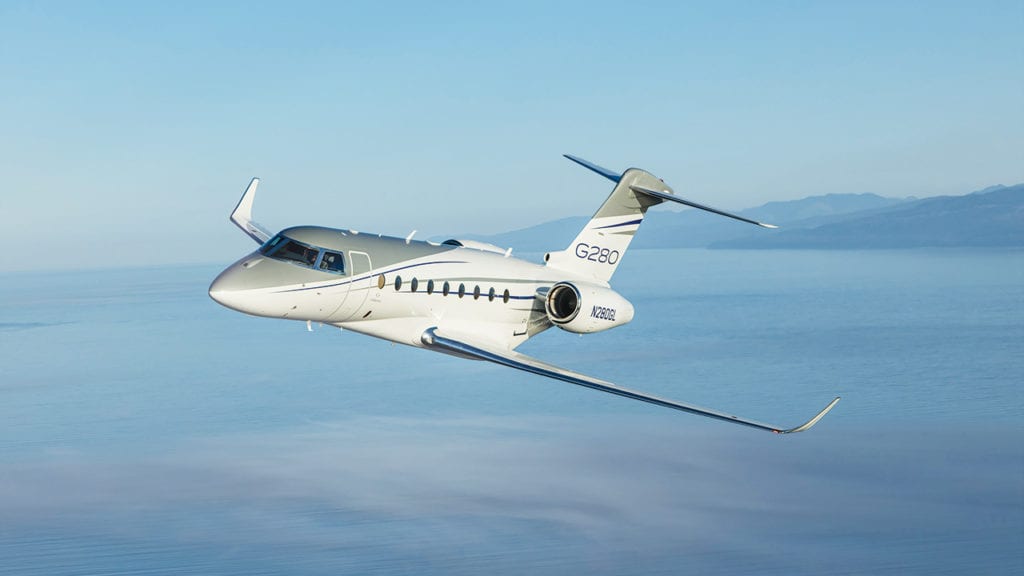
Honeywell Aerospace President and CEO Mike Madsen discussed some of the new avionics and engine technologies the company is developing during a virtual press event as part of the Virtual NBAA Business Aviation Conference and Exhibition (VBACE) on Dec. 2.
Honeywell Aerospace is focusing on supporting new and next generation business aircraft by innovating with propulsion and avionics systems, Mike Madsen, the president and CEO of Honeywell Aerospace, said. Madsen discussed the current climate of business aviation and a long-range forecast for the industry as well as Honeywell’s plans to address both topics during a Dec. 2 webinar.
Madsen said Honeywell will continue to upgrade the HTF engine family and create an entirely new engine centerline for larger and super midsize aircraft.
“We’re working on product improvement upgrades and technology assertions for the HTF 7000 series engines,” Madsen said. “We are also working on a new centerline engine that I will just say will be larger than the HTF engine and more to come on that. You know when you’re in the engine business, you never get out of the game. You’re constantly investing in these products. They have a long life, but they do need to be refreshed occasionally and we do see this general migration toward larger aircraft and the need and desire to be able to do with a mid-size airplane or a super mid-sized airplane what today can only be done with a large or ultra-long range aircraft.”
In terms of advanced avionics developments, Honeywell will be working on open software architecture flexibility and interconnectivity, Madsen said. This would be something similar to what the military is doing with the Future Airborne Capability Environment (FACE).
“The way we’re thinking about this is to think about core features that are tied to our fundamental aircraft performance and safety features, those things being sort of hard-coded but functionality, that’s tailorable wrapped around that,” Madsen said. “We want to make that available to the operators and to the airframers. It gives them a chance to make the aircraft a bit more be-spoke to that brand, or even to the operator that owns the aircraft. We think that’s going to be absolutely required in going forward.”
Another area where Honeywell sees interest is in connected offerings like satellite connectivity for cockpit and maintenance applications. He said the connected maintenance plans would be offered in conjunction with maintenance service plans already offered.
Among the connected aircraft applications under development are methods for automatically downloading engine data, Wi-Fi auto-billing and continuous engine health diagnostics, according to Madsen.
“Honeywell has introduced in a cell maintenance service plan for each for its HTF family of engines that now includes the new cell system and the components. This is for the Lombardi A Challenger 300 aircraft, the Challenger 350 aircraft, Gulfstream G280, and the Embraer Legacy 450/500 aircraft. And there are different options there I think you’ll see those kinds of things, all-inclusive maintenance plans,” Madsen said.
In 2021 Honeywell will also introduce a new lightweight micro-power unit mechanical system for smaller business aircraft that do not come equipped with an auxiliary power unit (APU), and they will also be releasing updates to their RDR 7000 weather radar system. The avionics maker will also be developing new compact fly by wire systems not only for business and general aviation, Urban Air Mobility (UAM), and unmanned aircraft systems (UAS).
The impact of COVID-19 is likely to still have consequences on the business aviation industry through 2022, however, in five years Madsen said he sees the industry growing again. The five-year purchase plans Honeywell is tracking for aircraft have been largely unchanged, he said.
“We’re expecting some strong growth, really growth in every segment, but the strongest segments for growth over the next 10 years will we expect to see in the super midsize and large cabin aircraft, Madsen said. “I think it’s an evolving situation, the buyers of super midsize and large cabin aircraft continue to rate operating costs, direct operating cost, and cabin size, either first and second or vice versa.”